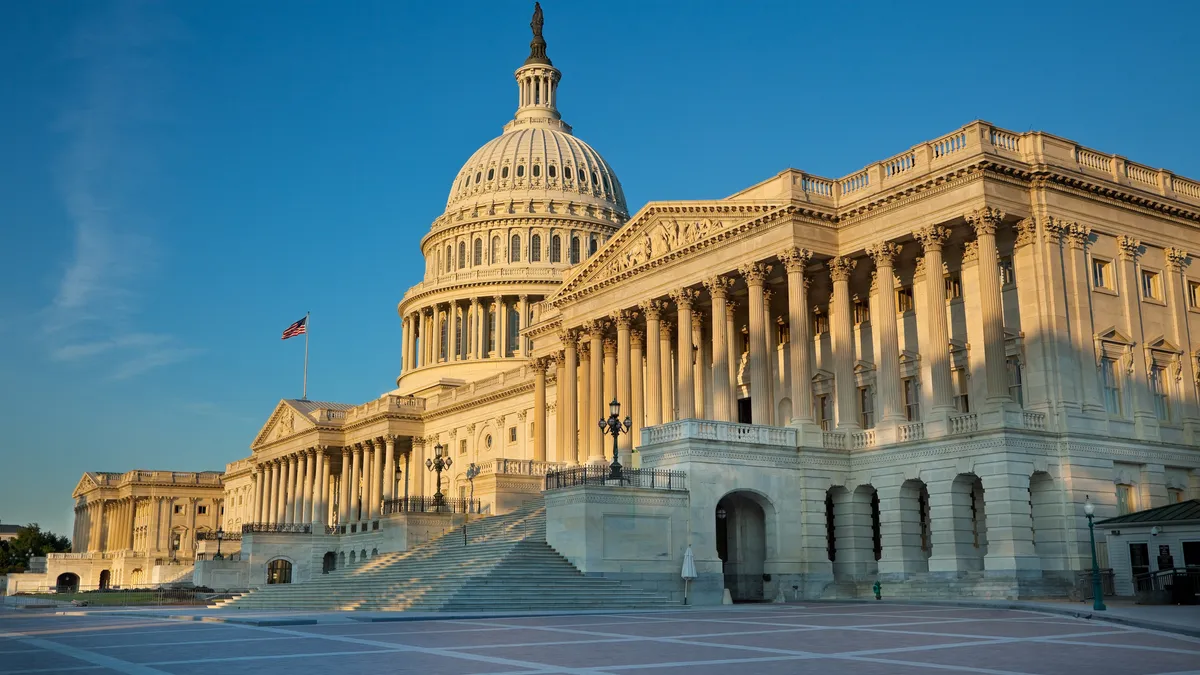Dive Brief:
-
With the support of Sen. Joe Manchin, D-W.Va., Senate Democrats on Wednesday unveiled a budget reconciliation bill that includes $369 billion in energy security and climate spending over the next 10 years.
-
The bill contains tax credits to spur clean energy production, domestic clean energy manufacturing as well as consumer incentives for energy efficiency and electric vehicles. It also contains funding for transmission development.
-
The bill is a key “first step” in addressing climate change, but more needs to be done, according to Sen. Sheldon Whitehouse, D-R.I. “I will continue to fight for additional climate legislation and urge the administration to take serious steps to fight climate change in order to build on this important first step,” Whitehouse said Wednesday on Twitter.
Dive Insight:
The bill is a breakthrough for Democrats after Manchin in December came out in opposition to the Build Back Better bill, which included about $550 billion over 10 years for clean energy and climate programs.
After opposing another effort at climate-related legislation two weeks ago over inflation concerns, Manchin reached an agreement with Senate Majority Leader Chuck Schumer, D-N.Y., on a bill that also includes tax and healthcare provisions.
“The Inflation Reduction Act of 2022 addresses our nation’s energy and climate crisis by adopting commonsense solutions through strategic and historic investments that allow us to decarbonize while ensuring American energy is affordable, reliable, clean and secure,” Manchin said in a statement.
The legislation invests in hydrogen, nuclear and renewable energy, fossil fuel and energy storage technologies, according to Manchin.
The Democrats aim to pass the bill under a reconciliation process that requires only a majority vote, which is why Manchin’s support is crucial in an evenly divided Senate.
The bill will invest in domestic energy production and manufacturing, and reduce carbon emissions by roughly 40% by 2030, according to a summary of the bill’s energy provisions.
The bill includes new production tax credits for nuclear power and clean hydrogen.
It also modifies and extends tax credits for technologies like wind, solar, geothermal, energy storage, fuel cells and microgrid controllers. It increases the tax incentives for wind and solar projects built in low-income communities.
The bill gives the Department of Energy $2 billion for loans for transmission projects in “national interest corridors,” $760 million to facilitate interstate power lines, and $100 million for interregional and offshore wind transmission planning and analysis.
The bill includes incentives for consumers to make their homes more efficient and electrify them. It also includes a $4,000 consumer tax credit for lower/middle income people to buy used clean vehicles, and up to $7,500 tax credit to buy new clean vehicles, according to the summary.
The bill offers $10 billion in investment tax credits for manufacturing facilities that make electric vehicles, wind turbines and solar panels, according to the summary. It also contains up to $20 billion in loans to build new clean vehicle manufacturing facilities.
The legislation provides $60 billion for environmental justice communities, including $3 billion in environmental and climate justice block grants, according to the summary.
Also, the agreement calls for comprehensive permitting reform legislation to be passed by the end of the fiscal year. “Permitting reform is essential to unlocking domestic energy and transmission projects, which will lower costs for consumers and help us meet our long-term emissions goals,” the one-page summary said.
Clean energy trade groups praised the bill.
“The entire clean energy industry just breathed an enormous sigh of relief,” American Clean Power Association CEO Heather Zichal said in a statement. “This is an 11th hour reprieve for climate action and clean energy jobs, and America's biggest legislative moment for climate and energy policy.”
The bill will spur investment by the clean energy sector, according to the American Council on Renewable Energy.
“Legislation that finally moves the country beyond years of on-again, off-again renewable tax credits and establishes a long-term, full-value clean energy tax platform will help provide renewable companies with the stability they need,” Gregory Wetstone, ACORE president and CEO, said in a statement.
The Center for Biological Diversity urged Congress to pass the bill, but said $37 billion a year for climate and renewable energy is “paltry” compared to the military’s $800 billion annual budget.
“What’s truly terrifying are the unknown concessions made to Sen. Manchin to get this desperately needed funding,” Brett Hartl, government affairs director for the Center for Biological Diversity, said.
The bill would require the Interior Department to offer at least 2 million acres of public lands and 60 million acres of offshore waters for oil and gas leasing each year for a decade as a prerequisite to allowing new solar or wind on federal land or in federal water, the group said Thursday.














